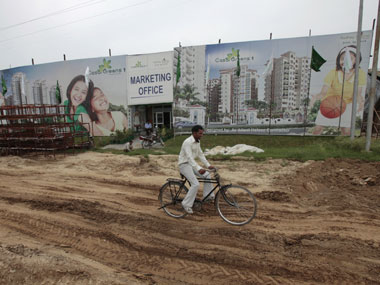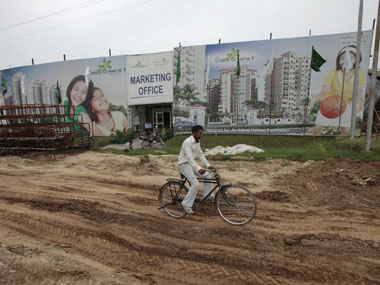The new Land Acquisition Bill proposed by Jairam Ramesh’s ministry and cleared by the cabinet on Monday is worthy of all the criticisms levelled against Anna Hazare’s Jan Lokpal Bill. It is unrealistic. It presumes that land is the central issue in inclusive growth. It is being trotted out like a silver bullet for all rural problems, just as Jan Lokpal was assumed to be the complete answer to corruption.
It is simply and egregious attempt to transfer wealth from one section of society to another without ultimately benefiting the economy.
If it is passed in anything like its current farm, the National Land Acquisition, Rehabilitation and Resettlement Bill will end up mollycoddling the rural landowner, retard job growth, slow down industrial expansion, and make corruption the central pivot around which the rural economy revolves. Of course, we can all give up the idea of affordable housing in urban areas. High-cost land in the suburbs will make prices impossibly high.
Before we delve into each issue separately, let’s see what the bill proposes.
• Anyone acquiring land of 100 acres or more in urban areas or 50 acres in rural areas will need the consent of 80 percent of the landowners. He or she will also have to compensate those working on the land.
• Compensation will be a minimum of four times the market value in rural areas, and twice the value in urban areas. Not only that, once the land is developed, 20 percent of the land has to be given back to the owners, and 20 percent of profits from sale or transfers within 10 years too will go to them.
Impact Shorts
More Shorts• Displaced individuals will be paid Rs 5 lakh. And families displaced - both landowners and people employed on that land - will receive subsistence allowances of Rs 3,000 per month for the first year, and an annuity of Rs 2,000 a month for 20 years. Plus there is a resettlement amount of Rs 50,000 and mandatory employment to one member of the family.
• The exceptions to these rules would be land acquired for public purposes - including for ports, highways, and railways, or land acquired for the government’s own use. Creation of infrastructure and industry by private companies can also be considered a public purpose - but the conditions are tough, since the requirement is that the benefits must largely accrue to the public. Can a for-profit factory in rural areas - which creates jobs - be considered purely a public benefit?
There are some good points in the Bill. The combination of acquisition and rehabilitation in one Bill makes for an unified law with no internal inconsistencies. The Bill will consolidate or supersede all current land acquisition laws, including those for the creation of special economic zones.
[caption id=“attachment_77388” align=“alignleft” width=“380” caption=“The land Bill will help proliferate slums and unhealthy living conditions in urban areas. Reuters”]
 [/caption]
[/caption]
But the Bill - which derived its urgency from the orchestrated rural protests against land acquisitions in various parts of the country, from Bengal to Orissa, Uttar Pradesh, Maharashtra and Karnataka - appears designed to mollify rural landed interests rather than genuinely promote inclusive growth and jobs. Worse, it does not address the country’s real economic challenges.
Our key economic challenges are:
• One, we have to move people away from unproductive agricultural jobs to productive non-agricultural (possibly urban) jobs.
• Two, we have to raise farm productivity to create genuine food security and a reduction of poverty and under-nourishment.
• Three, we have to reform laws that inhibit enterprise and restrict job creation, and make changes to ensure efficient utilisation of resources - including land.
• Four, we have to invest in people and skills - so that we have the wherewithal to grow as fast as our positive demography allows.
The proposed Land Bill, which has the sole aim of ensuring that land-owners are not expropriated or exploited when their land is acquired, may not achieve even this limited aim since the immediate impact will be a drop in demand for land due to over-pricing.
The value of land rises in proportion to the economic activity around it - and not by artificially pricing it high at the outset. There is thus a strong case to keep initial compensation levels reasonable, and backload it after the land is developed by creating a long-term income stream.
Continues on the next page
The new Bill will retard the creation of productive jobs in urban areas. India is rapidly urbanising, and is currently 32 percent urban. People are moving from disguised unemployment in the rural sector to productive work in urban areas. The Bill seeks to retard this growth by slowing down urban expansion (which means acquiring land for housing and factories) and creating more incentives to stay rural through higher payments for land and rehabilitation.
The land Bill will help proliferate slums and unhealthy living conditions in urban areas. Starved of land for expansion, our metros and cities will find more people being pushed to slums since land will be unaffordable even in the far suburbs - which is where the middle classes find a roof.
In most cities, the real cost of a home is the land it is built on - not the construction cost of buildings and apartments. By doubling or quadrupling land prices, homes will become unaffordable to all but the super-rich. So much for inclusive growth, where even the middle classes will be de-housed.
We will soon have a class of rural people who survive on land-related doles - and who will also claim their NREGA benefits and subsidised food. The rural rich will be overcompensated. Paying four times the market value, plus 20 percent of the value of the developed land, plus 20 percent from any sale or transfers, will make them the new leisure class in rural areas. We need more jobs, not more Gurgaon-style real-estate millionaires.
At a time when farming is anyway becoming increasingly uneconomic, farmers would prefer to sell land rather than grow something on it. The best way to make people grow less food is to make the land more valuable than the economic activity on it. It will make food security tougher to achieve. The class divide in rural areas will widen. It will be exclusive growth, not inclusive.
Starved of reasonably priced land, the manufacturing sector will start atrophying. India has had a skewed development model where our manufacturing sector is not creating new jobs. In the absence of labour reform, businessmen are automating at a faster rate than before.
If land too becomes a high-cost item, businessmen will migrate jobs and locate away from India. Most manufacturing companies are anyway becoming real estate companies in urban India (Check out Central Mumbai malls and offices). Now they will see land as more valuable even in rural areas - which will make manufacturing in the hinterland unviable.
The worst aspect of the new Land Bill is that it will exacerbate corruption. All land acquirers will now use strong-arm or underhand methods to obtain the consent of sellers. Since the law will be retrospective in effect, there will be a flood of requests with babus to back-date the completion dates of ongoing projects, since they would otherwise have to compensate and rehabilitate according to the new law. Developers will also look for loopholes and buy 49 acres under one head and another 49 under another. Further scope for corruption.
So, clearly, the Land Bill is not what the doctored ordered for India. What, then, would be a better alternative?
Here are some options.
When 80 percent consent is required for purchase of new land, why mandate a four-fold mark-up on the market rate? Best to settle the price through collective bargaining. Let the villagers or land-owners appoint someone to represent them, and bargain for the right price. But even 80 percent consent is not a great idea. Best to drop this requirement to 50 percent.
Why not offer a tradeoff between higher compensation and more jobs? What a land-owner or someone working on the land needs is a source of livelihood. So why not offer that rather than excessive compensation?
The real problem is low agricultural productivity. This is where the reforms need to happen - whether it is through more efficient utilisation of water resources, or better seeds and fertiliser, or new farming techniques - including probably a cautious opening to GM seeds. India needs a second green revolution, but it is nowhere in sight. Making land expensive does not help either agriculture or industry.
An even larger issue is growing jobs. Loss of land and compensation would be fringe issues if jobs were aplenty, since you can always chuck up your land and work elsewhere for a living. But jobs will not grow unless labour laws are reformed to promote employment rather than automation. Our entrepreneurs face too much red-tape and regulation and corruption. These are the areas to reform first.
Lastly, should land become yet another UPA entitlement scheme - this time for land-owners? Between 2004-05 and 2009-10 , the UPA economy has created all of two million new jobs when the previous five years created 92 million jobs. Do too many entitlement destroy jobs?
Incidentally, the biggest job growth during the last five years was in the construction sector (26 million to 44 million), when manufacturing and agriculture destroyed jobs. When land prices shoot, construction is the sector that will take the largest hit.
Sure we need a Land Bill that is fair to those who are going to lose it to industry or urbanisation, but it can’t be done at the cost of the latter. There is need for a better balance. Jairam Ramesh must go back to the drawing board.
)